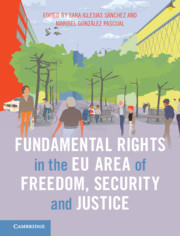Book contents
- Fundamental Rights in the EU Area of Freedom, Security and Justice
- Fundamental Rights in the EU Area of Freedom, Security and Justice
- Copyright page
- Dedication
- Contents
- Contributors
- Foreword
- Preface
- Common Abbreviations
- Introduction Fundamental Rights at the Core of the EU AFSJ
- Part I The General Framework for Fundamental Rights Protection in the AFSJ
- Part II Asylum, Migration and Borders
- 4 Mutual (Dis-)Trust in EU Migration and Asylum Law: The ‘Exceptionalisation’ of Fundamental Rights
- 5 The Right to Liberty in the Field of Migration, Asylum and Borders
- 6 Family Life and the Best Interests of the Child in the Field of Migration
- 7 The EU Fundamental Right to Asylum: In Search of Its Legal Meaning and Effects
- 8 Effective Remedies and Defence Rights in the Field of Asylum, Migration and Borders
- Part III Judicial Cooperation in Civil Matters
- Part IV Judicial Cooperation in Criminal Matters and Police Cooperation
- Part V Cross-Cutting Issues of Fundamental Rights in the AFSJ
- Index
4 - Mutual (Dis-)Trust in EU Migration and Asylum Law: The ‘Exceptionalisation’ of Fundamental Rights
from Part II - Asylum, Migration and Borders
Published online by Cambridge University Press: 06 August 2021
- Fundamental Rights in the EU Area of Freedom, Security and Justice
- Fundamental Rights in the EU Area of Freedom, Security and Justice
- Copyright page
- Dedication
- Contents
- Contributors
- Foreword
- Preface
- Common Abbreviations
- Introduction Fundamental Rights at the Core of the EU AFSJ
- Part I The General Framework for Fundamental Rights Protection in the AFSJ
- Part II Asylum, Migration and Borders
- 4 Mutual (Dis-)Trust in EU Migration and Asylum Law: The ‘Exceptionalisation’ of Fundamental Rights
- 5 The Right to Liberty in the Field of Migration, Asylum and Borders
- 6 Family Life and the Best Interests of the Child in the Field of Migration
- 7 The EU Fundamental Right to Asylum: In Search of Its Legal Meaning and Effects
- 8 Effective Remedies and Defence Rights in the Field of Asylum, Migration and Borders
- Part III Judicial Cooperation in Civil Matters
- Part IV Judicial Cooperation in Criminal Matters and Police Cooperation
- Part V Cross-Cutting Issues of Fundamental Rights in the AFSJ
- Index
Summary
This chapter deals with the functioning of ‘mutual trust’ as the organising principle of mechanisms of (implicit) mutual recognition in the fields of migration and asylum within the AFSJ, looking both at rights-conferring and rights-restricting measures, comparing their treatment. The chapter uncovers a contradictory dynamic whereby the mutual recognition of rights-restricting measures across the EU is quasi-automatic and practically unconditional, but the mutual recognition of rights-conferring measures virtually non-existent. The reason for this is claimed to be the interplay between presumed (abstract) trust, as required by the case law of the CJEU, and the real (practical) distrust, professed at horizontal and vertical levels in day-to-day EU migration and asylum governance. Such interplay produces insidious effects on third-country nationals, particularly in the case of asylum applicants, leading to the arbitrary ‘exceptionalisation’ of their fundamental rights.
Keywords
- Type
- Chapter
- Information
- Publisher: Cambridge University PressPrint publication year: 2021

